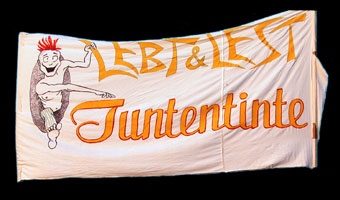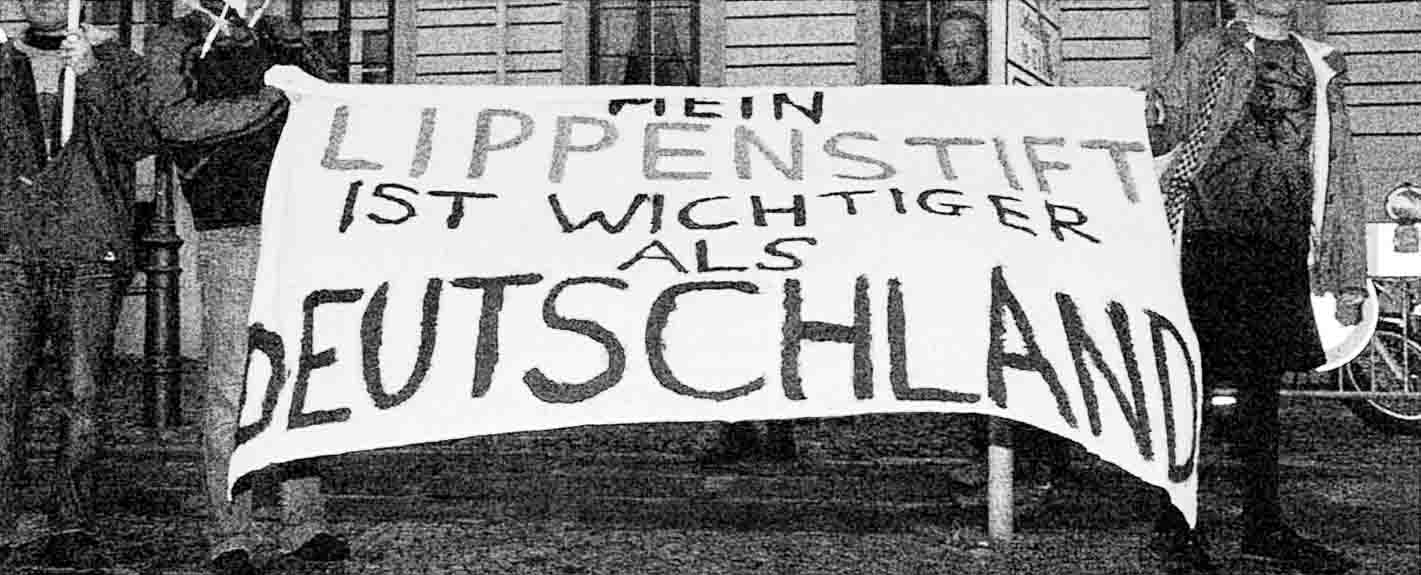Tuntentinte (Fag Ink) is inextricably linked to Homolandweek, a “biannual event in April or September where homos who call themselves autonomous gays, left-wing faggots, gay leftists or something like that meet to discuss tactics and strategy and personal matters together, to go for a walk, to play croquette …” (No. 9).
In the zero number, the motivation for a separate, written organ is cited: “The idea for this newsletter arose out of dissatisfaction that many discussions held on gay issues both in particular and in general have no forum, few leave our informal contacts, and are not very comprehensible to outsiders. So the purpose of this newsletter is to;
• create a forum for discussion among left-wing radical gays
• have a more binding discussion, which hopefully can be made transparent to many interested people through the form of the newsletter
• be able to discuss individual topics beyond the Landweek,
• and last but not least, to give new impulses for the content of the Landweek, to create a forum for the preparation and follow-up of the content (ideally)“.
Thus, the first issue of Tuntentinte saw the light of day in November 1994, and 23 more issues were to follow until (presumably) the end of 2003. Initially produced in Frankfurt am Main, Tuntentinte appeared every two months, but from No. 3 onwards the editorial office and postal address changed to the editorial office of the Institute for Delay and Acceleration of Time in Berlin, and from No. 19 onwards it was based in Hanover. While five issues were produced in 1995, this number decreased in the following years and settled down to 1-2 issues per year from 1999 onwards. The circulation was always tiny, at its peak it was 800 copies (from No. 17 onwards), even though a much broader readership can be assumed – especially with this blog 😉.

The Tuntentinte always had its own charm and wit, theoretical and discussion contributions alternated with cooking recipes, puzzles, collectible pictures, comics, and photo love stories. The writing was in German. There were contributions from Germany, the Netherlands, France, and Switzerland. It was distributed in Germany, Austria, Switzerland, the Netherlands and France through info shops, left-wing bookshops, autonomous housing and pub projects, caravan sites, and private individuals.
Topics of discussion included homophobia in the left, homophobia in Germany and other societies, critique of mainstream gay and lesbian politics, BDSM, communism, coming out, anti-militarism, anti-fascism, sexualized violence, pedo-sexuality, homosexual Nazi victims, prostitution, patriarchy, eroticism and pornography, anti-Semitism, friendship, queer, housing forms, and identity politics. There was also an astonishingly early thematization of intersex and transsexuality, which also manifested itself in the invitation policy of Homolandweek, which from the mid-2000s explicitly invited trans men as well. “Homolandweek has always been a meeting of cute punkers, perverted autonomists, ALG2 fags, gay trans men, left-wing homos and perverse students.”
While in the beginning, Tuntentinte was still a stapled collection of DIN A4 sheets, partly handwritten and with many reprints from other magazines, a steady professionalization took place. After 3 years, from the end of 1997 (No. 12), there were completely original texts on focal issues and a professional, unified layout. Two issues later, the new concept was described as follows: “Conceived as a newsletter of the Homolandweek, a biannual meeting of left-wing and radical left-wing gays, it was to be an exchange organ between the Homolandweek. The aim was to facilitate a cross-city discussion, not just for participants of the Landweek. These discussions became less and less comprehensible to outsiders. Conversely, many felt that the framework of the Tuntentinte was too official and anonymous to share personal information. In order to meet these two different needs, we changed the concept about a year ago.” From then on, there were the aforementioned focal issues, topics outside those issues (current political, gay/lesbian/queer discussions beyond the mainstream), fixed sections (recipes, puzzles, radi.OA.ton service page, columns), and Homoland in the Mirror (discussions, AGs, invitation, etc.).
Also, from No. 12 onwards, there was the “intimate section”, printed on different colored paper, which went only to subscribers who had taken part in the last two Homoland weeks. In order to understand this ‘intimate’ part, it was necessary to have followed the discussion at the Homoland Weeks over a longer period of time. It was also intended to create the familiar atmosphere in which a very personal approach to what has been experienced is possible, it says in No. 13.
Tuntentinte took another turn with a new editorial team at the beginning of 2001 with No. 19, which was based in seven different places and had its postal address in Hanover. The magazine was now published by the Cosmetic Institute for the Inner Beauty of the Faggot and the Committee for Good and Against Evil.
At the same time, part of the old editorial team had launched the internet project etuxx. In their farewell issue they wrote retrospectively: “The Tuntentinte itself is a project that originated in the gay autonomous scene. From the beginning, the readers were also supposed to be the authors. As the project grew, and with it the demand, the circle of this scene, which was still very closed at the beginning, began to open wider and wider. With each new issue we increased the circulation, not least because publishing a single issue, from the idea to printing and mailing, became more and more work, which was only worthwhile if as many people as possible got to read the Tuntentinte. With this opening to the outside, problems arose that could no longer be solved in the long run, concerning both the production process and the question of the target group, the ’scene‘. More and more often we stood alone between critics and fans of Tuntentinte; feedback on content was just as rare as suggestions for topics or offers to write. Writing for a left-alternative gay scene was apparently not motivation enough. We felt this above all with the authors who felt they belonged to the scene only in the broadest sense, but whom we found interesting and wanted to win over. So we were left with the thankless role of supplicants, a role that gets tiring in the long run. We felt more and more clearly how the scene for which we published had changed to the point of self-dissolution, so much so that today ’scene‘ can probably only be written in inverted commas. (…) Not least because of these existential questions for the Tuntentinte project, the idea was born to start an internet project and to let the Phoenix rise again from the ashes. (…) We have chosen the new medium because we still have a lot to say and want to unfold the political content in front of a larger audience in an even more beautiful and sensual way. www.etuxx.com is the magic word.”
The problems already addressed here were to remain. With the statement, “after all, the Tuntentinte is not a consumer newspaper, but a newsletter”, there was always an invitation to write and discuss one’s own contributions, which was also done in a thoroughly impressive manner, sometimes sharply and bitingly, and over several issues. However, a chronic lack of articles and torn deadlines always remained a problem. Furthermore, there were also constant funding problems. The Tuntentinte was not sold but financed exclusively through donations. In addition, there was a constant lack of staff and overwork (No. 17 states that after all the articles had been submitted, there were still over 250 hours of work to produce and send out a Tuntentinte). Last but not least, accusations of being ‘Berlin-heavy’ nagged at the project.
The last editorial team produced four issues and then planned a joint issue with the French counterpart bangbang – but this never happened. One last double issue was published and at the same time, a zero number of the tintentuntbrief, which was not continued under this name. “We propose to publish a tintentuntbrief instead of the Tuntentinte between the Homolandweeks”. This statement is, in a way, back to the roots, to the beginnings of the Tuntentinte.
From summer 2004 to autumn 2006, five issues of Tuntentinte extrakt were published, 150 copies each, under the responsibility of Homolandweek. Tuntentinte extrakt was the result of a decision at Homolandweek, “after it became clear that the people willing to do continuous editorial and design work on Tuntentinte did not exist at the moment” (ex. 3).
From March 2008 to April 2010, five PDFs of the Tuntentinte electronic, distributed by e-mail, were published by a virtual editorial team, asking the recipients to print them out and distribute them in their environments.
The development of the Tuntentinte also illustrates a certain technical development that has fundamentally changed the entire print media in recent decades. The Tuntentinte was created in a pre-internet era when contributions had to be submitted either on diskette or handwritten. From No. 7 onwards, texts could also be sent in by e-mail. From 1998 onwards there was also Tuntex (Tunten verschicken Texte – Fags send texts), a mailing list run from Amsterdam for exchanges in between Homolandweeks.
Precisely because Tuntentinte came into being in a pre-internet era and was created for a very small scene that tended to be manageable, not much thought was given to data protection. We as a blog, on the other hand, have made bank details and private addresses unrecognizable and pixelated the faces of photo love stories. After all, the people are still alive today and should not suffer any unpleasant consequences.
By the way, the fact that the Tuntentinte can now be found on the net disproves the assumption of some that one can find “just about anything” on the internet. This is a fallacy; all the more so when it comes to gray literature from social movements. There is so much (still) not online.
We as the Tuntentinte blog make the issues of Tuntentinte available because we think they are great and important! In our opinion, many topics and debates have not lost their topicality. We find some of the issues downright legendary, such as the focus issue on dealing with perpetrators, which was immediately out of print at the time, or the issue on eroticism and pornography, which is a milestone of emancipatory discussion on these topics. The former issue is particularly noteworthy, not least because before the time of blogs and web 2.0, all authors were sent all texts in advance. Because of this, they could react to them, and all this was printed in the issue. So, the original texts were not smoothed over, but the discussion around them was made transparent. Fantastic.
A few years ago, we already put the Männerrundbrief (men’s circular), the heterosexual counterpart to the Tuntentinte, online, and were also interested in countering right-wing narratives with a critical discussion about masculinity. This intention is to be continued by putting the Tuntentinte online. The texts collected on this blog come from a decidedly radical left-wing gay movement that discussed “queer” very early on, wanted to smash the patriarchy, included a Gay Antifa, and had a healthy skepticism towards identitarian references. Critical discussions around sexuality and masculinity are linked to the desire for emancipation and liberation, and represent an important counterpoint against right-wing, masculi(ni)st, anti-feminist, antique, and conservative constrictions.

This blog features an interview conducted in late 2021 with two ex-editors and a personal retrospective by a reader interested at the time. The issues of Tuntentinte themselves can be downloaded here, and you can find further links here. As a special treat we have put online the reader of the 2nd meeting of Anarchy and Sensuality, which took place in Berlin in February 1988. Something about the background of these nationwide meetings can also be found in Tuntentinte 18 on p. 12.
If you have a personal contribution to the Tuntentinte, please feel free to send it to us – we would be happy to hear from you! If you have any info on publication dates where we are not sure, have additional copies of Tuntentinte extrakt or electronic, find spelling mistakes, or if you have any other feedback for us: please write to us!
Last but not least, we would like to ask you to spread the word about this blog. We don't have the capacity and reach to do that.
Merci and see you soon
Blog Tuntentinte
